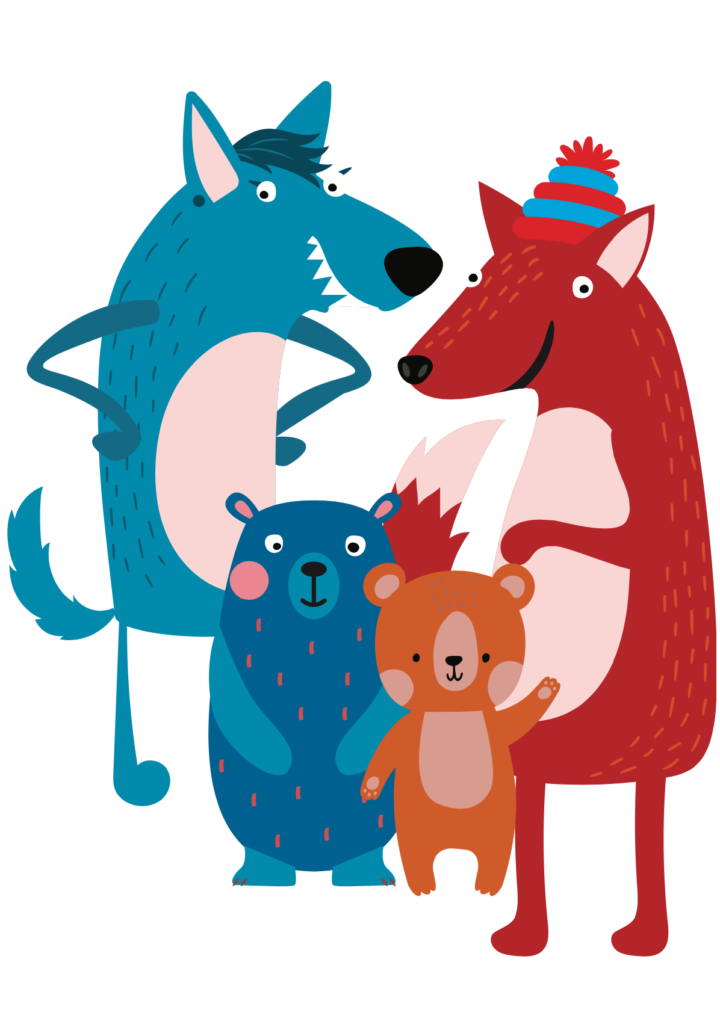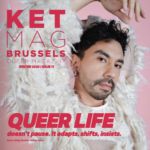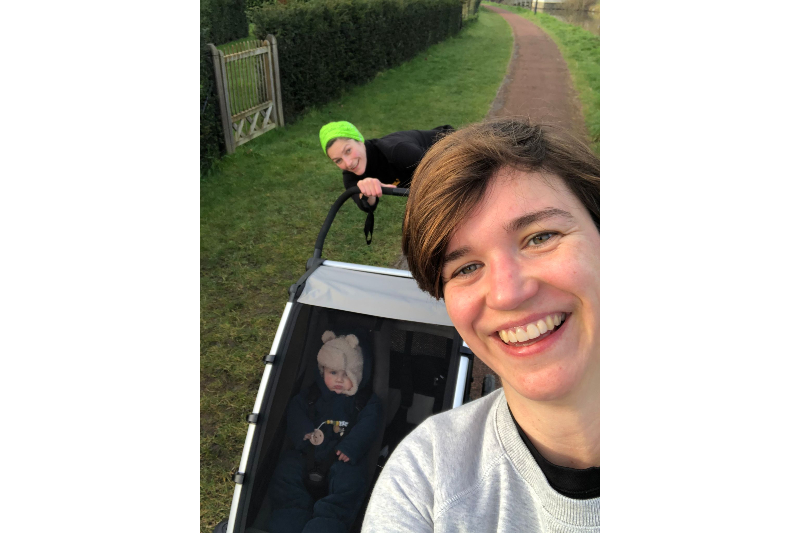Written by Jozefien De Wolf, in close collaboration with Famke Vandenbroele
I am writing this article with my seven-day old boy sleeping on my chest. Ludovico Enaudi is playing in the background, Noah’s Ark playmobil is covering our living room floor, leftovers from an early-morning pajama playing session with our toddler.
How did we even end up here?
Ten-year-ago-me would hardly approve of this. When did I change into such a norm-conforming person, a sheep that tries its utter best to be part of the flock? Then again, as a queer parent, you are never entirely a sheep amongst other sheep. A goat, maybe.
That being said, in many ways, queer parents are just like straight parents. They don’t get enough sleep, they never get to go to the bathroom alone anymore, they break a leg tripping over plastic cars, they try and fail, and then try again.
Opening up the dialogue
In spite of all that, when you decide to become a same-sex parent, you know you will never fully conform to the heterosexual norm. One of you will always be genetically unrelated to his or her child, and your child will always lack either a mommy or a daddy.
How you deal with that is up to you. The choice is kind of the same one you had to make when you first came out as queer: You can either engage in a full-frontal battle with what is considered normal, emphasizing every step along the way how different you are, or you could focus on how – at the end of the day – it might not matter all that much who is sleeping with whom, or who is procreating with whom. Looking at it that way opens a dialogue, and like Harvey Milk said, ‘unless you open the walls of dialogue, you can never reach to change people’s opinion.’
Concept of family
When you look at it like that, queer parents are a fantastic vehicle to redefine the concept of family. Since you are not entirely normal anyway, you get to be creative with what you want your family to look like. Last week for instance, I was listening to Eke Krijnen’s Axi in de Maxi(cosi), a Dutch podcast on parenting. She and her girlfriend have two children, with a close friend as the father, so a family with three parents.
Legally, their family does not exist, as – up until now – there are no countries in the world where children can have more than two legal parents. The law is of course always slower than the society it regulates, and since there are increasingly more different types of families, it is only a matter of time before the law will recognise more than two parents: Blended families, two lesbians and a gay father, two gay men and a lesbian mother, friends forming a family, a single parent’s new boy-or girlfriend…
Our specific type of family is closer to the norm: two gay women and one sperm donor. Since 2015, the law has recognised us by letting co-mothers acknowledge their children immediately after they were born, instead of going through a long process of adopting their own children.
Legal recognition and realizing you have the power to help redefine the concept of family are great, but unfortunately, it doesn’t mean that you are fully sure of how to define yourself as a parent, a definition that seems to be hard on some people around you as well.
‘The daddy manual’
When we announced we were having a baby, a friend handed me a little book on things to know when becoming a dad. I wouldn’t recommend it to any dad, except maybe one looking to start a family in the 1950s. But even if it had been a fountain of useful tips, I still didn’t feel they would apply to me, since I wasn’t becoming a dad. But if I wasn’t giving birth, was I becoming a mom then? A co-mom? A parent: definitely, a parent looking for what would define her as such. Society doesn’t offer many answers: There is mother’s day and father’s day, not co-mother’s day or co-father’s day.
At the time, I didn’t have many examples of co-moms around me to help answer all my questions. What would my role be? Would people think of me as ‘not real’ because I didn’t give birth to my son, even though I technically could have? Would my parents accept my child as their grandchild? Would I love my child without being genetically related to it? Would my child love me as much as its other mom?
The love-part turned out to be very easy, something every other co-parent can confirm. You are there from the moment they are born, before they are born, you have helped dream them into existence. A friend of mine about to become a co-mother said she wasn’t worried, because how could she not love someone who came from a wife she loved so much? And, fortunately, with children, it turns out, if you love them, they tend to love you back.
Will the real mom please stand up?
The answers to the other questions are trickier, and other people don’t always help. There’s the time I went to city hall to acknowledge my newborn son, which should have been an extremely joyful moment. I found myself walking the Rainbow crossing, passing the ‘We are LGBTQI+ friendly!’ sign at the entrance, hoping for a lovely conversation with the officer of the Civil Registry. The lady was indeed lovely. However, she emphasized one too many times that I could take ‘Father leave’, not finding any other words, and asked me twice if my wife was indeed the real mom.
So I left the building, now officially not the real mom.
I started talking to other co-moms, and all of them had similar stories. No matter how normal we think we are, sometimes someone says something that makes you think it was all in your head, and that to actual normal people, we are still freak shows. For instance, when friends who – based on their youth and overall coolness – should be woke as hell, ask you whether your son and daughter have the same father. Or when an – admittedly older and less woke, but still not ancient – colleague asks you whether you and the friend-to-become-donor will conceive of the child through insemination or ‘naturally’.
It raises a number of concerns that straight parents probably do not have: Will my child be looked at as different? Will this hurt them? And – after your child’s kindergarten teacher has told you she never had a child of queer parents in her class, but that she thinks you are ‘really OK’ – : Should I pick a school where there are other queer parents? These are not just questions gay parents ask, anyone who’s different in any way has probably worried about this.
Passing it on to the next generation
Me and my friend didn’t used to worry about being different. IIt used to be all laughs and jokes: about dykes, about how our black friend could not be found in the dark unless she was smiling etcetera. Now that we all have procreated, we’re still laughing, but something has changed. Suddenly we worry whether dyke or black jokes are still funny when addressed to our children in the playground. That being said, you really don’t want to go through life as the dead-serious, always politically correct and militant parent, marching in every Black or Gay-Pride Parade. Or maybe you do. Or you should, not sure.
The upside to all of this, as mentioned before, is that if people don’t really know how to define you, you are completely free to define yourself, and choose your own words. For someone with mommy issues, it’s great not having to be the biological mother and choosing to have your child call you by your name, instead of ‘mom’. Another perk of this choice is not being forced to coincide with a title, but instead giving a whole new dimension to your own name.
But all of these considerations are frankly not a very big part of our everyday life, because ironically, with all of the parenting we do, there isn’t all that much time left for considering parenthood. Writing this with a toddler and a newborn baby was hard, to say the least. It required the input of another co-mom, who had just as many problems finding the time and energy to think and write about her queer family, as children of queer families are just as exhausting, demanding and utterly fantastic to have around as any other children.
About the author:
Jozefien (34) and Famke (37) used to be cycling buddies in fitter days. The bikes were exchanged by kids, the friendship lasts. They are co-creating a book together on their journey in and towards co-motherhood. Jozefien is the subject of the article, whilst Famke co-created the piece.

You may also like
-

The New KET Is Out: Queer Brussels Keeps Moving
KET Magazine Issue 11 is out now and available in LGBTQIA+ safe spaces across Brussels,
-

Brussels Art Guide 2026: Mapping a Vibrant Contemporary Scene
Brussels is once again putting its contemporary art scene in the spotlight with the new
-

What is Sex-Positive Belgium?
Sex-Positive Belgium is a growing, real-life community of open-minded people who embrace a sex-positive philosophy. It welcomes
-

“Bi+ Equal: Europe’s First Platform Uniting Bi+ Communities Across Borders”
Bi+ Equal is the first-ever bi+ structure at the European level, a new platform created
-

“From Borders to Belonging: How Arc-en-Ciel International Guides LGBTQIA+ Migrants to Safety and Community”
Arc-en-Ciel International Rainbow (AIR) is an online platform created for and with LGBTQIA+ migrants, refugees

